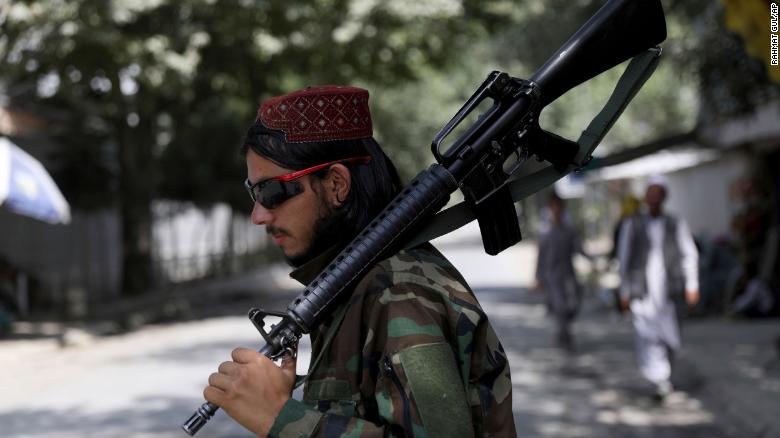World Bank stops financial support to Afghanistan 1:01
London (CNN) -
The sudden fall of Kabul and the near-total takeover of Afghanistan by the Taliban has left many of America's former partners wondering what will become of the US-led, values-based international order.
Although President Joe Biden's troop withdrawal by August 31 is inevitable, the speed with which the situation fell into chaos and the White House's lack of repentance and flexibility has left allies disoriented.
The first US soldiers begin to leave Afghanistan after Biden decided not to extend the evacuation
On Tuesday, Biden's allied G7 leaders, led by UK Prime Minister Boris Johnson, lobbied the US President to extend that deadline in order to remove foreign nationals, Afghans who they have assisted allied troops and other vulnerable groups.
But Biden was adamant.
As America's allies see it, especially in Europe, the country is distancing itself, washing its hands of a crisis in whose creation it has had much to do, and without taking into account the problems that this creates elsewhere. .
As a senior European official told CNN: "When the United States backtracked on Syria, it caused a crisis in Europe ... not the United States."
Refugees from Afghanistan wait to board a bus after arriving and being processed at Dulles International Airport in Dulles, Virginia, on August 23, 2021. About 16,000 people were evacuated in the last 24 hours from Afghanistan through the airport from Kabul, the Pentagon said on August 23, 2021, as the US accelerates to complete the air evacuation before the August 31 deadline.
Credits: ANDREW CABALLERO-REYNOLDS / AFP via Getty Images
The reason this is so hard for the allies to digest is that much of world foreign policy, especially in Europe, is based on the assumption that America's commitments to the values-based Western order, through of the UN and NATO, they are ironclad.
Europe's dependence on the United States in terms of international affairs is nothing new.
Throughout Trump's presidency, European diplomats and officials repeatedly spoke to CNN about the need for something they call strategic autonomy.
However, the lack of a coherent policy has held back these efforts, and in the context of Afghanistan, that means that when the United States withdraws, everyone withdraws.
advertising
The NATO treaty opens with the promise that: "The Parties to this Treaty reaffirm their faith in the purposes and principles of the United Nations Charter and their desire to live in peace with all peoples and governments."
The Charter of the United Nations to which it refers reads: "The purposes of the United Nations are ... to maintain international peace and security and, to this end, ... to adopt effective collective measures to prevent and eliminate threats to peace ".
Critics struggle to see how Biden's recent behavior fits in with these commitments, and they worry that it confirms America's exit from the world stage.
However, Biden has argued that his country's counterterrorism mission in Afghanistan was accomplished a decade ago, when US troops killed al Qaeda leader Osama bin Laden, and that the United States remains a leader elsewhere in the world. world stage, including in humanitarian efforts.
Speaking Tuesday about his meeting with the G7, Biden told reporters: "We speak of our mutual obligation to support refugees and evacuees currently fleeing Afghanistan. The United States will be a leader in these efforts and we hope that the international community and our partners do the same. "
"We all agree that we will stand side by side with our closest allies to meet the current challenges we have in Afghanistan, just as we have done for the past 20 years," he also said.
But many have doubts about what that means in practice.
Biden sustains departure from Afghanistan on Aug. 31 1:19
"For me, this shows the end of a geopolitical era, which consisted of the creation of a liberal international order, and the beginning of a new one, which consists of competition between China and the United States," Mark Leonard, director, said Tuesday. of the European Council on Foreign Relations.
A Taliban fighter stands guard at a checkpoint in the Wazir Akbar Khan neighborhood of Kabul city, Afghanistan, Sunday, Aug. 22, 2021.
The departure of the United States from a key strategic area has also created opportunities for its international enemies to increase their influence in Afghanistan in terms very different from those demanded of the West.
Historically, the support of the United States, and by extension of the West, to countries like Afghanistan was given in exchange for a counterpart.
"What made Western support so attractive to countries around the world was the underlying commitment to helping countries build liberal and open democracies and a society based on the rule of law," says David Lidington, President. of the Royal Institute of United Services and former Deputy Prime Minister of the United Kingdom.
"One of the consequences of the defeat in Afghanistan is the lack of confidence in the West, which can only be positive for China and Russia, which can offer their support without taking into account the rule of law or human rights," he adds.
China's new relationship with the Taliban was already in the making in July, before the militant group took control of the country.
Chinese Foreign Minister Wang Yi met with a Taliban delegation in northern China, where both sides reached an agreement: China would help the reconstruction of Afghanistan, and in return the Taliban would guarantee regional stability.
This is how the world reacts to the Taliban's takeover 1:36
As CNN reported, the fall of a stable government in Afghanistan and the subsequent triumph of the Taliban is not necessarily a good thing for China and, in some respects, represents more of a headache than anything else.
However, the initial phase in which China met with Taliban leaders confirmed the perception, at least in the eyes of America's European allies, that China is willing to take advantage of the vacuum left by the United States, although it is little. likely to fill it militarily.
Based on current reports from Afghanistan, the Taliban's way of achieving stability now is unlikely to meet Western human rights standards, but it might not pose an obstacle to Beijing's support given China's poor record. on human rights.
A week after the fall of Kabul, what it means for the world and who benefits from the advance of the Taliban
Russia has also reached out to the Taliban in recent days, and its Foreign Ministry has said it will not evacuate its embassy when Kabul falls.
Although the Taliban are - at least on paper - officially outlawed by Moscow, the Kremlin maintains working contacts with the Taliban, who it claims have "begun to restore public order" since they took power.
This is the same Russia that supported stability in Syria by providing its brutal president, Bashar al-Assad, firepower and assisting in air strikes against rebel groups.
Russia has denied this, saying it was exclusively targeting ISIS.
It is also the same Russia in which opponents of the Kremlin are poisoned and imprisoned.
Afghans gather on a road near the military portion of Kabul airport on August 20, 2021, hoping to flee the country following the Taliban's military takeover of Afghanistan.
In recent years, China and Russia have acted together, using international institutions to attack the West.
According to Velina Tchakarova, director of the Austrian Institute for European Policy and Security, China and Russia are already "operating within the existing global order with the clear objective of disrupting it, dismantling its multilateral structures" to promote visions of multilateralism that compete with that of the West. .
"The coordinated efforts of China and Russia in the UN Security Council (for example, in the case of Iran and now probably Afghanistan) and in other international organizations will continue to increase as both states try to improve their image. international as norm-makers in a rapidly changing rules-based world order, "he adds.
The withdrawal of troops from Afghanistan, and the subsequent rush to evacuate vulnerable people, fits this narrative.
Rightly or wrongly, the US commitment to withdraw in such a tough timeframe will be seen as the catalyst for the Taliban to seize control of the country.
How the aftermath of this is managed will likely influence the way its allies and enemies alike view America's legacy in Afghanistan.
Leslie Vinjamuri, director of Chatham House's Program on America and the Americas, says that people will "judge the United States in Afghanistan based on how it handles the humanitarian situation that develops, if it accepts a large number of immigrants, what kind of humanitarian aid undertakes to provide ".
He adds that if "Afghanistan becomes a failed state or a serious humanitarian crisis occurs, many people will blame the United States, rightly or wrongly. And this will undoubtedly feed the narrative of US hypocrisy when it comes to it. from the human rights".
The Taliban would agree to allow Afghans to leave the country after August 31, says a German envoy
By extension, that guilt and those charges of hypocrisy will also fall on the feet of Western allies who, once the United States decided it was time to leave, had no choice but to do so as well.
And that offers a great opportunity to those who wish to take the place of the West on the world stage, without the moral obligations.
Taliban fighters stand guard outside Hamid Karzai International Airport in Kabul, Afghanistan, on Monday, Aug. 16, 2021.
The fight for Afghanistan may be over, but some believe the West still has work to do.
Tom Tugendhat, a UK lawmaker who served in Afghanistan and chairs the Foreign Affairs Select Committee, believes that the Western alliance still has a role to play in Afghanistan, which will have global implications.
"We can invest in the UN and launch and use its programs to support the Afghan people," Tugendhat said.
"We can bring in regional partners from India, Pakistan, Uzbekistan and others to work together. The Taliban are not universally popular, but they are inspiring others. Islamist groups in Africa and Asia are inspired and we have to work with partners from everyone. We have to start acting internationally. "
The reputational blow to the West from what is happening in Afghanistan will not be fully known for some time.
What is clear for now is that if America's allies want to have the option to serve their own interests globally, they have to accept that, as things stand, they are insufficient.
Fears Grow That The Taliban Have Seized US Digital Databases In Afghanistan
That means countries that have long relied on the stability of America's commitment to promoting Western values will have to rethink their foreign policy.
If Mark Leonard is right, and this is truly the end of a geopolitical era, those countries will have to reorient their priorities on a terrifying new basis: that the United States is simply not that interested anymore.
Afghanistan



